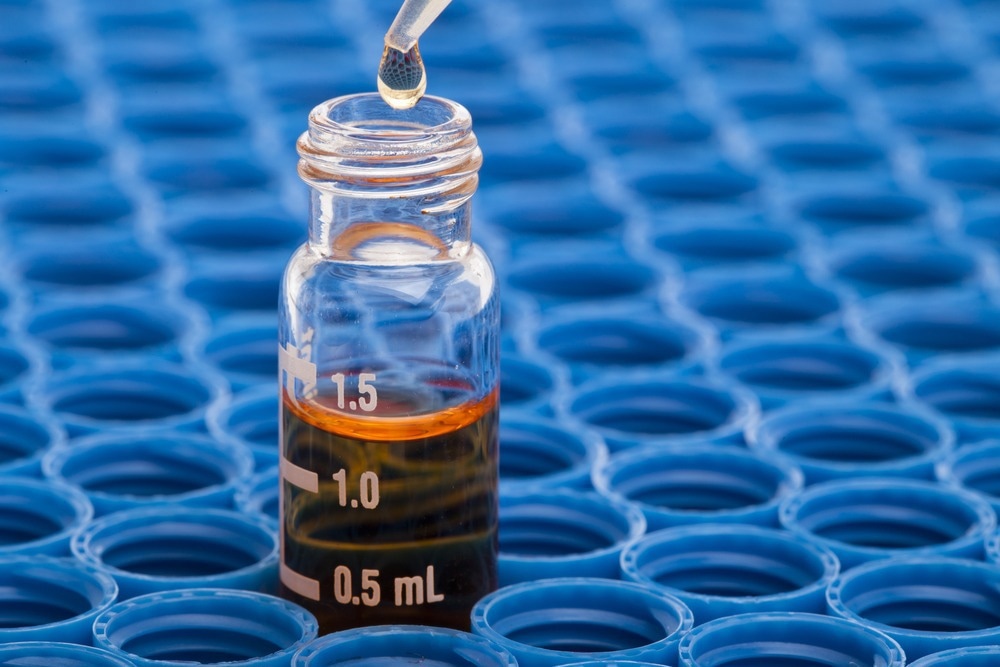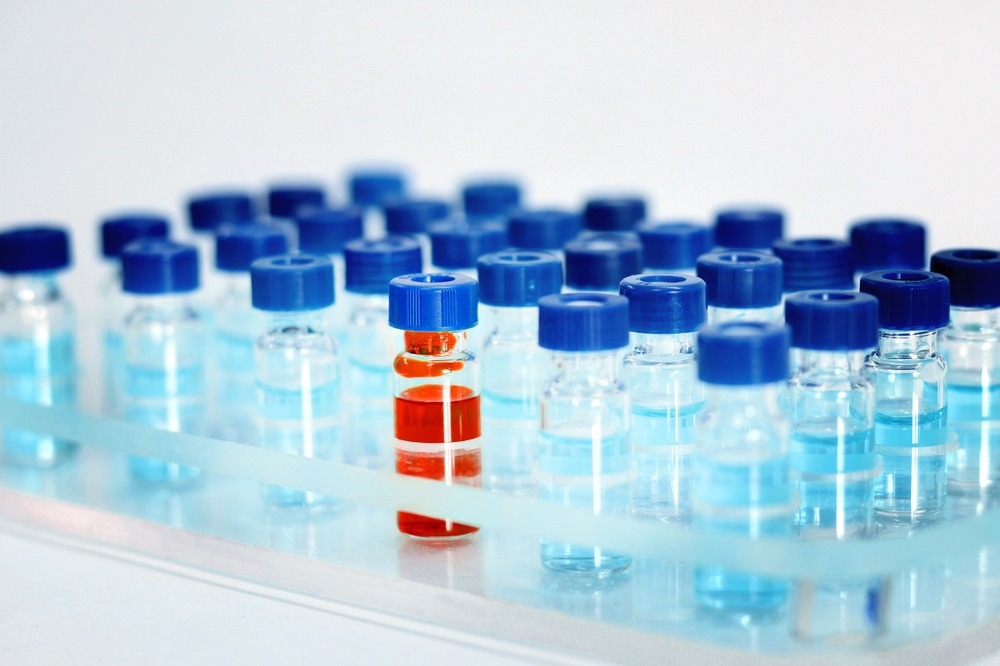Recently, Phytocontrol, a French company, has collaborated with Fujitsu (a Japanese company), to automate chromatographic techniques using Artificial Intelligence (AI). AI-enhanced chromatography offers quick sample analysis without any human error.
Food products must be accurately analyzed to prevent contaminants from being introduced into the supply food chain. If the contaminant-detecting process is weak, entire populations could get affected. As stated above, chromatography is one of the most reliable techniques to analyze food samples, i.e., both processed and raw products.
According to a recent World Health Organisation (WHO) study, approximately 0.4 million people die annually due to the ingestion of contaminated food.

Image Credit: Nikita G. Bernadsky/Shutterstock.com
Importance of Chromatography
Chromatography is a reliable analytical technique that is used to separate mixtures into individual components such that each component can be analyzed individually. This technique is used for the separation, identification, and purification of various samples.
Different types of chromatography, such as gas chromatography (GC), high-performance liquid chromatography (HPLC), and high-performance thin-layer chromatography (HPTLC), are commonly used in various industries, laboratories, and academia for different purposes, including the detection of contaminants in food and beverages, forensic investigation, and quantitative estimation of metabolites.
The most important aspect of optimizing chromatographic methods is to achieve high resolution within a short period of analysis. In traditional optimizing methods, various chromatographic factors, such as the pH of the mobile phase, column temperature, and composition of the mobile phase, are adjusted to achieve sufficient resolution. This process is challenging and time-consuming because many factors influence chromatography. To minimize these drawbacks, AI-based models and chemometrics are used.
Chromatography techniques require a skilled technician to operate, and it can take up to 30 minutes to complete analyzing a single sample. As Phytocontrol analyzes thousands of samples every day, they have aimed to automate the entire process. The introduction of artificial intelligence and machine learning has substantially expedited the analyzing process without compromising accuracy.
Robotic and AI-Enhanced Chromatography for Food Analysis
Food samples must be analyzed to detect the presence of contaminants. While chromatographic techniques are extremely sensitive, they remain time-consuming and open to human error.
Phytocontrol offers detection of food and water contaminants. To provide accurate contamination analysis, they use AI-based chromatographic analysis. Partnering with Fujitsu, a new solution has been created. It aims to tackle the problems associated with the conventional chromatographic system via an intuitive interface based on a new enterprise resource planning (ERP) platform.
Here, Fujitsu incorporated wide-ranging AI techniques and digitalized the overall contaminant analysis pipeline of Phytocontrol. The digital transformation has enabled wider integration across detectors and technicians, opening up opportunities for new business services.
Artificial intelligence techniques have been used to automate and expedite data analysis. This approach has enabled rapid analysis and identification of the unknown chromatogram peaks, based on the predictive capability, trained using extensive sample interpretations.
The team required six months to develop a viable product that satisfied COFRAC (Comité Français d’Accréditation: the French accreditation body) specifications. The new AI-based system was designed for predictive control plans, control plan modeling, and assisted interpretation. This system can accurately analyze samples within seconds. The designing team stated that the AI-based chromatography analysis would be provided via the cloud-based Fujitsu Computing as a Service (CaaS) system from 2023.
Fujitsu AI eliminates the risks associated with human error and is linked to the ERP system; results can be delivered to customers directly without requiring manual entry. Besides reduced analysis time, automation with a user-friendly interface significantly decreases the sample burden on the technical team.

Image Credit: Endorphin_SK/Shutterstock.com
The potential for AI-enhanced chromatography goes beyond a single sector. In the future, Fujitsu and Phytocontrol have planned to extend their AI services, based on the analysis technology, to other global sectors such as healthcare and cosmetics.
Besides Phytocontrol, Virtual Control, a Hong Kong-based company, has developed AI technology and machine learning-based software to provide analytical solutions in laboratory testing. In the case of Virtual Control, AI has been integrated with chromatography and mass spectrometry (GC/MS) platforms.
The integrated product is known as ACIES, which has enhanced the accuracy, efficiency, and productivity of laboratory testing. This technology can benefit a wide range of industries, including agriculture, food, environment, and applied materials.
Advantages of Integration of AI and Laboratory Instrumentation
In the laboratory, AI helps with data management and analysis. The integration of AI within laboratory instrumentation has enhanced operation, automation, and real-time optimization. The integrated product can simplify the operational process and instrument control. In addition, this system can improve the workflow and allow scientists and technicians to be free from repetitive and tedious tasks of instrument handling.
Automating the labor-intensive GC/MS data analysis has proved to be extremely advantageous in improving laboratory workflow patterns, i.e., from sampling to reporting. In the future, AI could be integrated with other analytical technologies for efficient laboratory and industrial processes.
References and Further Reading
AI-enhanced chromatography aims to boost analysis accuracy and speed. (2022) [Online] Available at: https://www.labnews.co.uk/article/2092137/ai-enhanced-chromatography-aims-to-boost-analysis-accuracy-and-speed
Ensuring food safety and boosting healthy living with AI. (2022) [Online] Available at: https://www2.fujitsu.com/uk/customer-stories/cs-phytocontrol-20210813/
AI Technology to Enhance Workflow through Automated Analysis. (2022) [Online] Available at: https://www.chromatographytoday.com/news/news/68/agilent-technologies-inc/ai-technology-to-enhance-workflow-through-automated-analysis/57266
Ghali, U.M. et al. (2020) Advanced chromatographic technique for performance simulation of anti-Alzheimer agent: an ensemble machine learning approach. SN Applied Sciences. 2, p. 1871. https://doi.org/10.1007/s42452-020-03690-2
Quinlan, A. (2015) Advances in Chromatography Automation. [Online] Available at: https://bioprocessintl.com/downstream-processing/chromatography/advances-chromatography-automation/
Disclaimer: The views expressed here are those of the author expressed in their private capacity and do not necessarily represent the views of AZoM.com Limited T/A AZoNetwork the owner and operator of this website. This disclaimer forms part of the Terms and conditions of use of this website.